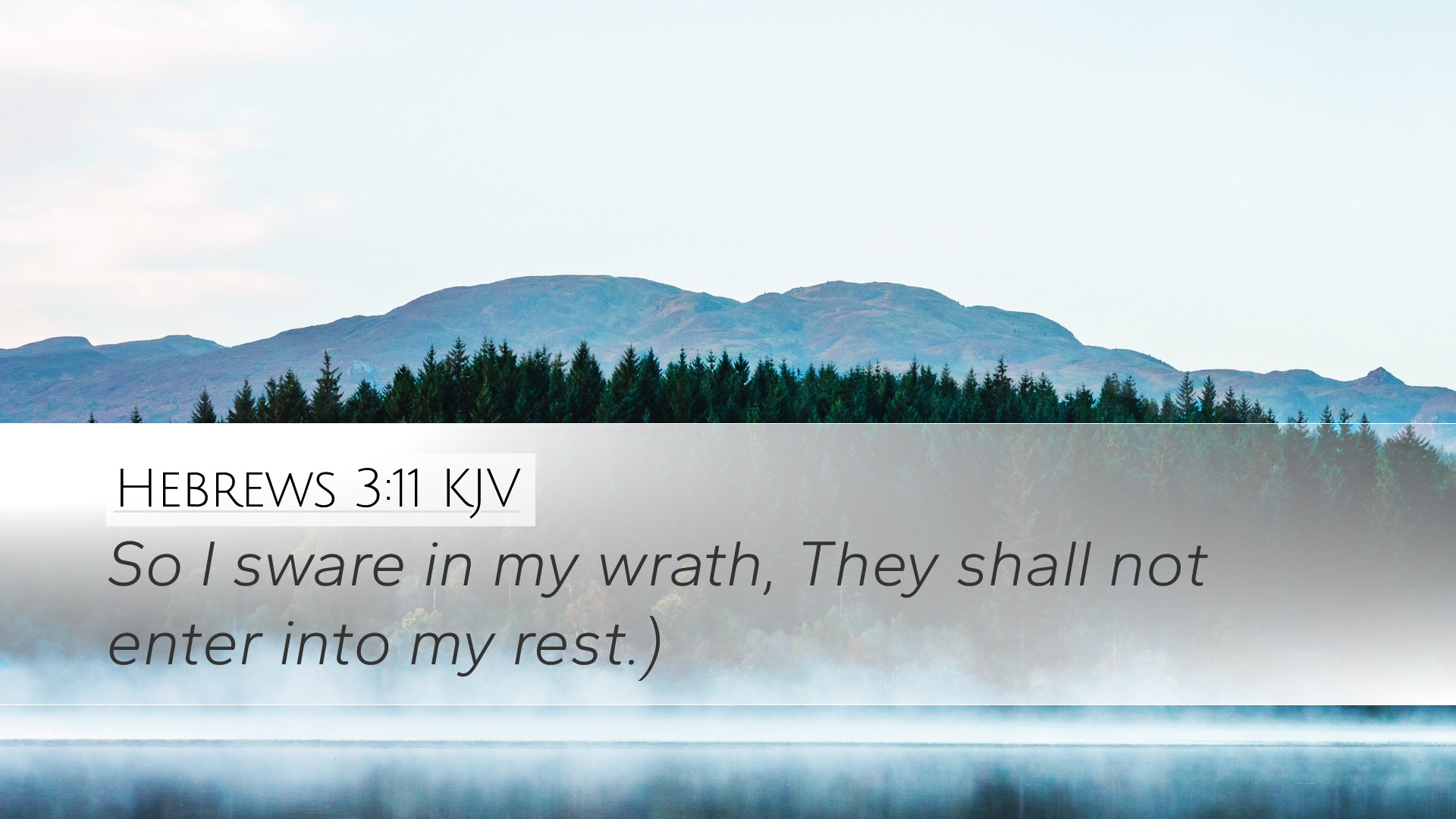Old Testament
Genesis Exodus Leviticus Numbers Deuteronomy Joshua Judges Ruth 1 Samuel 2 Samuel 1 Kings 2 Kings 1 Chronicles 2 Chronicles Ezra Nehemiah Esther Job Psalms Proverbs Ecclesiastes Song of Solomon Isaiah Jeremiah Lamentations Ezekiel Daniel Hosea Joel Amos Obadiah Jonah Micah Nahum Habakkuk Zephaniah Haggai Zechariah MalachiHebrews 3:11
Hebrews 3:11 KJV
So I sware in my wrath, They shall not enter into my rest.)
Hebrews 3:11 Bible Commentary
Commentary on Hebrews 3:11
Hebrews 3:11 states: "So I swore in my wrath, They shall not enter into my rest." This verse captures a profound moment in Scripture, a divine declaration that underscores the seriousness of disobedience and the consequences of unbelief. Throughout theological history, this verse has been a focal point of discussion concerning God's rest, the implications of faith, and the warnings against hardening one's heart.
Contextual Analysis
To fully appreciate the depth of Hebrews 3:11, it is essential to examine its context. The author of Hebrews, likely writing to Jewish Christians, reflects on the historical account of Israel's unbelief during their wanderings in the wilderness.
- Historical Background: The author references the Old Testament, particularly Psalm 95:11, where God expresses His displeasure with the Israelites who doubted His promises and authority. This historical narrative serves as a cautionary tale for contemporary believers.
- Theological Implications: The author connects the historical event to the concept of "rest," which not only pertains to physical rest but also spiritual fulfillment and communion with God. The rest of God is a recurring theme throughout Hebrews, representing salvation and the fulfillment of God's promises.
Insights from Matthew Henry
Matthew Henry, known for his comprehensive Bible commentary, emphasizes the gravity of God's promise: "They shall not enter into my rest." This declaration is not capricious but rooted in divine justice and holiness. Henry argues that this statement reveals God's anger towards sin and disobedience. He categorizes the “rest” of God as both a present reality and a future hope for believers.
- Divine Wrath: Henry notes that God's wrath is not arbitrary but a response to the unfaithfulness of His people. The juxtaposition of God’s mercy with His justice invites believers to contemplate the seriousness of their faith.
- Encouragement to Faithfulness: He encourages readers to remain steadfast in their faith to avoid the same pitfalls, drawing parallels between the ancient Israelites and modern believers.
Insights from Albert Barnes
Albert Barnes, with his exegetical approach, elucidates the implications of the phrase "I swore in my wrath." He describes this as a solemn oath, highlighting the irrevocable nature of God's judgment against unfaithfulness. Barnes emphasizes the importance of recognizing that this statement serves as a warning to believers today.
- Warning Against Unbelief: Barnes expounds on the theme of unbelief, suggesting that the failure of the Israelites is a perpetual warning against the danger of hardening one's heart against God’s voice.
- Rest as a Assurance: He elaborates that entering God’s rest is synonymous with salvation and divine peace, a privilege that becomes available through faith in Jesus Christ, reinforced by the promise of eternal life.
Insights from Adam Clarke
Adam Clarke provides a detailed analysis of the phrase "They shall not enter into my rest." He breaks down the rest mentioned here, emphasizing that it goes beyond a mere cessation of labor. Clarke's thoughts reflect on the character of God and His desire for intimacy with humanity.
- The Nature of Divine Rest: Clarke posits that God's rest is restful communion and perfection. This insight reveals the ultimate goal of salvation: to be reconciled and at peace with God.
- Call to Reflection: Clarke implores believers to reflect on their own hearts and ensure they are not in danger of disbelief, linking this admonition to the overall theme of perseverance in faith found throughout Hebrews.
Theological Reflections
Hebrews 3:11 serves as a sobering reminder of the realities of divine judgment and the urgency of faith. The commentary from these respected figures in biblical scholarship emphasizes the dynamics of God’s justice and mercy.
- Modern Relevance: Pastoral leaders and theologians must convey the seriousness of faithfulness in the present day, recognizing that hardening one’s heart can lead to spiritual exclusion from God's promises.
- Encouragement for Believers: While Hebrews 3:11 warns of consequence, it also provides the framework for understanding grace and the importance of faith in entering God's rest.
- The Unchanging Nature of God: Both Clarke and Barnes emphasize that God’s principles remain unchanged—His invitation into rest is always open to those who believe, while His judgment remains for those who reject Him.
Conclusion
In conclusion, the verse Hebrews 3:11 serves as a poignant reminder of the importance of faith, the reality of divine judgment, and the hope of entering into God’s rest. Through the perspectives of Matthew Henry, Albert Barnes, and Adam Clarke, we see a multifaceted portrayal of God's character, His promises, and the responsibility of believers to respond with faith and obedience. Such reflections should deeply inform the theological understanding of pastors, students, and scholars, encouraging them to embrace the path of faith and perseverance amidst a world often prone to doubt.


